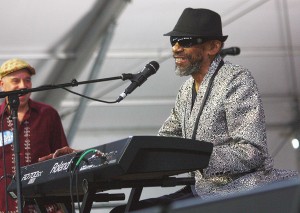Legendary pianist and vocalist, Henry Butler, dies
9th July 2018 · 0 Comments
By Geraldine Wyckoff
Contributing Writer
Henry Butler
September 21, 1948 – July 2, 2018
One could always expect the unexpected from Henry Butler as a brilliant musician and man. Musical boundaries didn’t exist for the powerful, virtuosic pianist and vocalist who could — and did — play it all. Sightless since birth, Butler demonstrated the same fearless confidence conquering the obstacles of everyday life as he did musically, often to the amazement of those around him. A true New Orleans treasure, Henry Butler died on Monday, July 2, 2018 at the age of 69.
At six-years-old, Butler discovered the piano at a neighbor’s home and then began taking lessons at the Louisiana School for the Blind in Baton Rouge, Louisiana. He attended Southern University in Baton Rouge (SUBR) where he studied under the direction of the highly-influential educator and clarinetist Alvin Batiste. Years later, in 1987, Batiste would join Butler on one of the pianist’s finest recordings, The Village (Impulse!) and contribute the moving cut, “Music Came,” that remained in Butler’s repertoire through the decades. Butler’s rich baritone voice haunts the spirituality of the song.
Butler also credited Batiste for setting up his opportunity to study with Professor Longhair in 1975. “Fess told me, ‘You don’t have to play like me – just do what you do,’” Butler once remembered.
Butler went on to earn a masters degree at Michigan State University, though, Henry being Henry, it was not, as one might presume, in piano rather it was awarded in voice. That’s the way Butler rolled.
The supremely accomplished pianist could move around and through an even familiar tune taking detours from jazz to blues, throw in some classically informed references and land on some funky New Orleans rhythm and blues. He might smile a little in doing so, enjoying the excursions and seemingly knowing how he had probably messed with an audience’s stylistic anticipations.
Even throughout his recording career, Butler, who well into his career once called himself, “a work in progress,” jumped genres, returning to jazz on For All Seasons, further exploring the blues on Blues & More Volume I and digging into his hometown roots on Orleans Inspiration. He shone as a composer on 1998’s Blues After Sunset superbly teamed with another eclectic, no-holds barred, sightless musician, the great guitarist Snooks Eaglin. His more recent work with trumpeter and bandleader Steven Bernstein & the Hot 9, with whom he recorded 2014’s Viper’s Drag and played with at the 2018 Jazz & Heritage Festival, could perhaps be best described as Henry Butler with horns. Butler, who also led his own group, the Jambalaya Band at last year’s festival, a performance that sorrowfully marked his last appearance at Jazz Fest, was there at the annual event’s start, performing in Congo Square in 1970.
Papa Henry Butler & the Steamin’ Syncopators, the pianist’s full-on traditional New Orleans jazz band that he formed in 2002, lit up stages like the one at the Nickel-A-Dance show series. “I really did want a forum for playing more traditional jazz,” Butler said of his enduring interest in pursuing classic jazz.
Not surprisingly, through the years, Butler bopped around the country quite a bit residing, perhaps testing the waters, in various locales. He was back in in New Orleans for a spell in the mid-70s and taught at NOCCA and gigged locally before moving to California and then to New York, It’s certain that he enriched the lives of his students during his time as a professor at Eastern Illinois State University. Meanwhile, Butler brought his brilliance to audiences around the world.
Finally, in 1996, Butler came back to New Orleans to again make it his home. It was joyous for many to have him here, playing regularly at local clubs again and spreading his freedom message. Just nine years later, he was driven out when the levies breached following Hurricane Katrina and his home was flooded. Boulder and then Denver, Colorado took him in before he moved to New York where he found a vital scene and where he spent his final days until he passed last week.
“I’ve always felt like I was one of the New Orleans ambassadors,” Butler once declared. “I think I will always feel that way. I think most of the people that I know who are from New Orleans feel like that. That’s how we came up, that’s what we knew and that’s what we still want to play. Most of the people I know from New Orleans are proud to share the music with the world. I mean it’s so unique you know.”
Henry Butler was in that number of great, influential and individualistic New Orleans piano players that boasts the likes of Professor Longhair, James Booker, Allen Toussaint, Fats Domino and Dr. John. He’s one of the guys who has influenced another, and yet another, generation of musicians like Davell Crawford and Jon Cleary who pursue rising to his great challenge of inventiveness and musicality.
Henry Butler’s enormous shoes can never be adequately filled or replaced though they leave a large enough imprint to be tracked and followed by those who love music’s adventure. A dynamic presence, Henry Butler will long be missed and remembered.
This article originally published in the July 9, 2018 print edition of The Louisiana Weekly newspaper.




